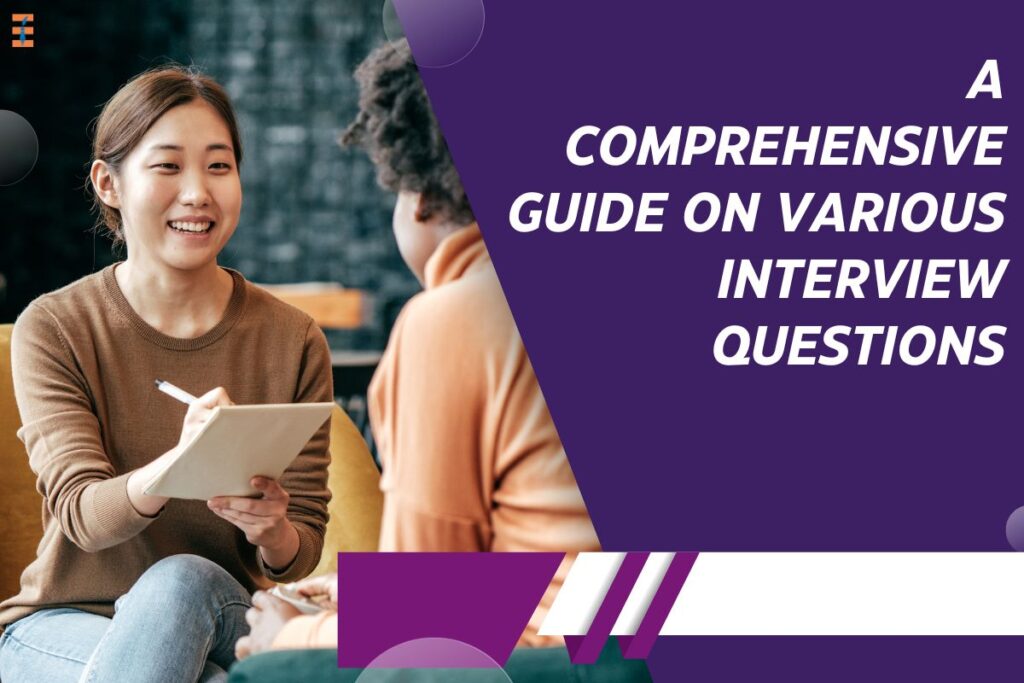In the realm of professional growth and career advancement, interviews serve as pivotal gateways. Whether you are a seasoned professional or a recent graduate, navigating interviews requires finesse, preparation, and a deep understanding of the questions that may come your way. This article is a comprehensive guide to interview questions, exploring various types, strategies for answering them effectively, and tips for acing this crucial stage of the job-seeking process.
Understanding the Types of Interview Questions:
Interview questions come in various forms, each designed to unveil specific aspects of your qualifications, skills, and personality. The three primary types are:
1. Behavioral Questions

These delve into your past experiences to assess how you handled various situations. Example: “Can you share an instance when you successfully resolved a conflict within your team?”
2. Situational Questions
These pose hypothetical scenarios to evaluate your problem-solving abilities and decision-making process. Example: “How would you handle a project that is significantly behind schedule?”
3. Traditional Questions
These are general inquiries about your background, strengths, weaknesses, and motivations. Example: “Can you tell us about yourself and your professional journey?”
Preparing for Behavioral and Situational Interview Questions:
1. Behavioral and situational questions often require the STAR method:
- Situation: Describe the context.
- Task: Explain your role and responsibilities.
- Action: Detail the steps you took.
- Result: Conclude with a positive outcome.
For instance, if asked about a challenge you overcame, outline the situation, describe your role, detail your actions, and conclude with a positive result. This method ensures clarity and demonstrates your ability to navigate challenges effectively.
2. Navigating Traditional Interview Questions with Authenticity:
Traditional questions, although seemingly straightforward, require thoughtful responses. When asked about strengths and weaknesses, focus on genuine attributes and experiences. For strengths, provide examples that align with the job requirements. When discussing weaknesses, emphasize growth and improvement. This authenticity fosters a connection between you and the interviewer.
3. Handling Unexpected Interview Questions with Grace

Interviewers may throw unexpected questions to gauge your ability to think on your feet. These can range from brain teasers to abstract queries like “If you were a fruit, what would you be?” Approach such questions with a calm demeanor, showcasing your ability to handle ambiguity and showcasing your creativity or problem-solving skills.
4. Researching the Company and Tailoring Responses
Before the interview, extensively research the company’s values, culture, and recent developments. Tailor your responses to align with the company’s mission and demonstrate a genuine interest in their goals. This preparation showcases your commitment to the role and enhances your chances of standing out among candidates.
5. Highlighting Soft Skills
In the eyes of employers who now prioritize attributes like communication and adaptability, showcasing instances where you’ve demonstrated these qualities in past roles adds depth to your professional profile. This emphasis affirms your capacity to collaborate and excel in varied work settings, going beyond technical prowess. These essential attributes reflect your interpersonal finesse and resilience in challenging situations. Narrate specific scenarios where your communication facilitated team cohesion and your adaptability proved crucial in navigating change. Elevating the prominence of soft skills not only positions you as a well-rounded candidate but also as an asset capable of thriving in the ever-evolving dynamics of the professional landscape.
6. The Importance of Asking Questions

Interviews are not only an opportunity for employers to evaluate candidates but also for candidates to assess potential employers. Prepare thoughtful interview questions that demonstrate your genuine interest in the role and the company. This engagement signals your proactive approach and desire for a mutually beneficial partnership.
7. Steering Through Salary and Compensation Conversations
Conversations about salary can be sensitive yet pivotal. Research industry standards and gain a precise understanding of your professional value. When queried about salary expectations, furnish a range grounded in your research. Furthermore, assess the comprehensive compensation package, encompassing benefits, and opportunities for professional development.
8. Harnessing Mock Interviews for Preparation
Mock interview questions stand as invaluable aids for readiness. Engage a friend, mentor, or career coach to recreate interview scenarios. Exercise responses to common questions, fine-tune your answers, and welcome constructive feedback. This iterative practice cultivates confidence, hones your presentation, and elevates your proficiency in articulating experiences and skills convincingly.
Conclusion
Mastering the art of interviewing requires a blend of preparation, authenticity, and adaptability. Understanding the types of interview questions, preparing for behavioral and situational inquiries, and emphasizing soft skills contribute to a well-rounded interview strategy. By approaching unexpected questions with grace, tailoring responses to the company, and proactively engaging in the conversation, candidates can navigate interviews successfully. With practice, research, and a proactive mindset, individuals can transform the interview process from a challenge into an opportunity for professional growth and career advancement.
Also Read: Mastering the Art of Negotiation Skills: A Complete Guide

